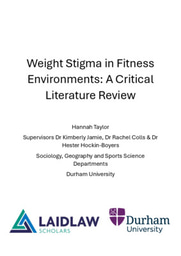Research Project Outline: Weight discrimination and weight discrimination training among fitness professionals: An international scoping exercise

Introduction
Weight discrimination refers to the unequal treatment of individuals based on body size. It is common in both professional and social settings, including healthcare and the fitness industry (Kost et al. 2024). 84% of plus-size and underweight gym users report feeling judged negatively through being made to feel uncomfortable or unwelcome by other gym members or staff (Hughes, n.d.). This impacts their engagement with and experiences of gyms, exercise groups, and outdoor activities. Paradoxically, these individuals are often told to exercise more in the environments that stigmatise and discriminate against them, which can discourage them from returning. For obese people from lower socioeconomic groups and/or areas of high deprivation, such marginalisation further embeds health inequalities. Zuest et. al (2023) and Lee et. al (2024) suggest that fitness professionals play a key role in perpetuating weight discrimination in fitness settings. Significantly, a study by Panza et al. (2018) found 85% of exercise professionals showed weight bias, both explicit or implicit, which potentially impacts client experiences, engagement and overall health outcomes. Better training in weight discrimination has been identified as a way to address this bias among fitness professionals and to improve relationships with gym-goers of all body sizes. Although weight discrimination training has been developed for healthcare professionals, there is a need for similar education in other fields to promote inclusivity and reduce discrimination. In the US, research by Zuest et. al (2023) suggests such training could be effective in the fitness industry.
This project builds on existing academic and commercialisation work by Jamie, Colls and Hockin-Boyers. It aims to explore the prevalence of weight discrimination among fitness professionals in the UK and assess the availability and effectiveness of training programmes addressing this issue within the sector.
Research Objectives
- To assess the prevalence and forms of weight discrimination among UK fitness professionals.
- To identify and analyse existing training programs for UK fitness professionals on weight discrimination.
- To evaluate gaps in training and propose recommendations for developing targeted training materials.
Research Outcomes
- A synthesis of literature into a scoping review feeding into a market validation report. This will form part of the groundwork for a new direction in a commercial venture led by Jamie and Colls.
- An academic publication targeted at the journal Fat Studies.
- A conference presentation for the annual International Weight Stigma Conference or a relevant physical activity-related conference
- A list of resources on weight discrimination for fitness professionals, serving as the foundation for developing specific training materials.
Methodology
My research will analyse existing studies on the prevalence of weight discrimination among fitness professionals, the forms of weight discrimination in fitness settings, current training programmes addressing the issue and what gaps exist in current training and resources. Using reports from fitness organisations, journal articles and industry guidelines, I will produce a literature review to provide an evidence base for UK-focused training and a list of resources which will support future training materials.
By the end of the project, I expect to have a comprehensive understanding of the extent and nature of weight discrimination in the fitness industry, which will help develop targeted training materials. I hope this work will raise awareness of "fatphobia" particularly in the fitness industry, leading to significant socioeconomic benefits, in the form of improved public health outcomes, increased workforce participation and economic productivity, and more equitable health policies.
Significance and Impact
This scoping review aims to develop new insights into “fatphobia” within fitness spaces, which will be significant for body, space and physical activity scholars, with implications extending beyond academia. Additionally, by exploring and validating a new market, the research contributes to ongoing commercialisation efforts by Jamie and Colls, who are in the process of developing a weight discrimination training organisation.
By developing training resources, the research has potential to inform policy, education and professional development within the fitness industry. Highlighting the prevalence and varying forms of weight discrimination, will shape future training initiatives, advocate for more inclusive practise and ultimately contribute to reducing weight stigma in fitness environments.
Overall, the research aims to improve gym accessibility for people of diverse weight categories and body size by reducing body discrimination and stigma. Although the research primarily focuses on education about the ‘fat studies literature’ to address discrimination against individuals labelled ‘overweight’, it will also raise awareness and coach against discrimination against those considered ‘underweight’, who also experience stigma in fitness settings (Hughes, n.d.). An important aspect of this work is ensuring that training programmes are individualised so they are not solely weight centric, instead offering a holistic approach to health and fitness. This shift will challenge the dominant public health narratives that overly focuses on weight loss, promoting more inclusive and productive training practices.
References:
Hughes L. (n.d.) ‘Weight Stigma Study: Exploring weight discrimination in society and the gym,’ Origym, https://www.origym.co.uk/blog/weight-stigma-study/
Kost C., Jamie K. and Mohr E. (March 2024) ‘ “Whatever I said didn’t register with her”: medical fatphobia and interactional and relational disconnect in healthcare encounters’, Frontiers in Sociology, Vol. 9, DOI:10.3389/fsoc.2024.1303919
Lee S., Zuest L., Fogaça J., Squires N., Balam C., and Clifford D. (20. May 2024) ‘An Interdisciplinary Collaboration to Reduce Weight Stigma Among Exercise Professionals’, Journal of Physical Education, Recreation & Dance, Vol. 95, Issue 5, pp 28–33, https://doi.org/10.1080/07303084.2024.2319533
Zuest L, Lee S., Fogaça J., Squires N. and Clifford D. (11. December 2023) ‘WIT FITS: Effects of Weight Stigma Intervention on Exercise Professionals’ Attitudes Toward Fatness: A Randomized Controlled Trial.’, Recreational Sports Journal, Vol. 48, Issue 1, pp 3-13, https://doi.org/10.1177/15588661231219098


Please sign in
If you are a registered user on Laidlaw Scholars Network, please sign in